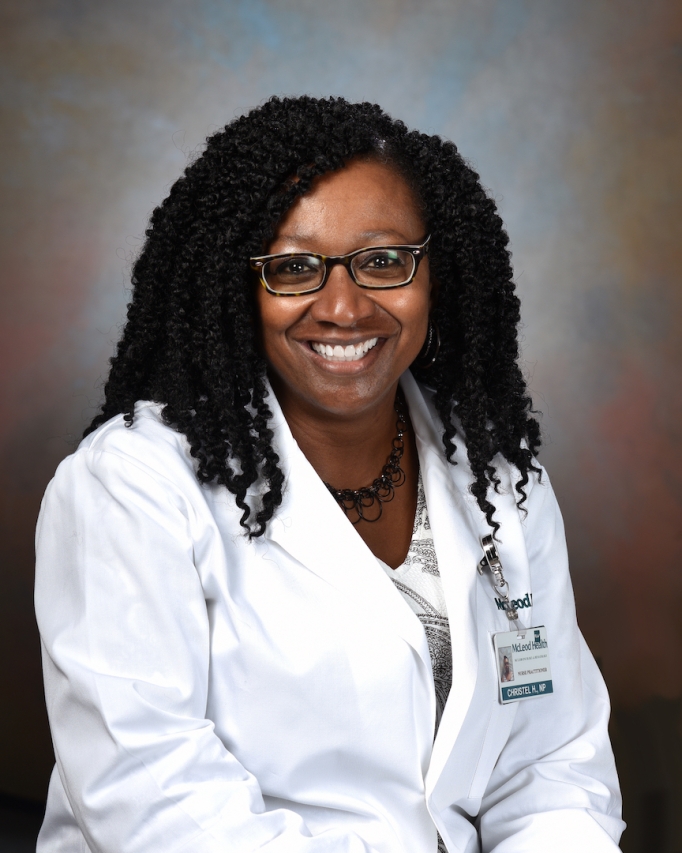Guiding the Genetic Needs of Patients and Families

By Christel Hayes, FNP-C
McLeod Oncology and Hematology Associates
The body is made up of trillions of cells, which contain genes. These small segments of DNA determine specific human characteristics as well as the risk of developing certain diseases. Changes or mutations in an individual’s genes can provide the wrong set of instructions, leading to faulty function, or abnormal cell growth.
A person can be born with gene mutations, or they can happen over a lifetime. Mutations can occur when cells are aging or after exposure to certain chemicals or radiation. Fortunately, cells usually recognize these types of mutations and repair them. Other times, however, they can cause disease, such as cancer.
Some mutations are changes that have been passed down from generation to generation. These are considered hereditary. An individual with a hereditary disease risk has genes that make them more susceptible to conditions such as cancer than someone in the general population. These individuals need greater surveillance, have family considerations that should be discussed, and they may possibly require surgeries or medications to help decrease their risk.
A risk factor is anything that increases the chances of developing a disease. Some of the factors associated with an increased disease risk include lifestyle, age, family history, gender, and inherited gene changes. In my role with the McLeod Cancer Center, I work in collaboration with clinicians to provide screening, education, and testing to identify hereditary gene mutations known to increase the risk of cancer or other diseases.
Predictive genetic testing can be performed to look for these gene mutations. Genetic counseling and testing may also be recommended for individuals with a personal or family history of certain cancers or diseases, due to the increased risk of having a hereditary gene mutation.
At McLeod Oncology and Hematology Associates, we offer pre-test counseling about genetics, obtain a collection of your family history and determine if you are suitable for genetic testing. In gathering family history, I like to review at least three generations – the patient, children, mother/father, aunts, uncles, grandparents, and siblings if they are alive. I also like to know the age family members died and the cause as well as any cancers and what age they were diagnosed.
When someone is interested in their genetic history, I always explain that the affected person should be tested if possible unless they have died. You go to the source of the person who gave the gene. However, you should test whoever wants to be checked. You cannot put a price tag on peace of mind.
Testing involves a sample of saliva or blood that is sent to a genetics lab for analysis. The lab results are then compared with the patient’s DNA to determine whether they have any of the gene mutations. It typically takes 14 to 21 days to get the results back.
After their first appointment with me, they are scheduled for a return visit to review the results in three weeks. At this appointment, if the results are positive, I go through the management of what they should do going forward as far as screenings or treatment as well as the best specialist who can monitor them. I also provide a copy of their results to share with their provider.
In addition, if someone tests positive for a genetic link, the next steps involve informing their blood relatives on the same side of the family. Everyone on this side of the family needs to know and undergo testing. And, if a family member is at high risk, then they can be screened and monitored to detect cancer at an early, treatable stage.
Learning the genetic results can also help guide treatment for the patient with cancer. For example, certain chemotherapies respond better to a genetic positive cancer.
If someone has a family and/or personal history of cancer or another hereditary disease or they know of a genetic mutation in their family, they can call me to be tested. They can also be referred by their provider. For more information, please call (843) 777-5951.
Individuals should consider genetic testing if:
- A relative has tested positive for a genetic mutation
- There is a personal or family history of rare cancer (e.g., male breast cancer, ovarian cancer, pancreatic cancer, colon cancer, metastatic prostate cancer) or another disease
- There are many relatives on one side of the family who has had the same or associated cancer or disease
- A family member has more than one type of cancer or two separate cancers in the same organ
- Family members had cancer at a young age, or cancer diagnosed prior to the age of 50
- Ashkenazi Jewish Ancestry 9 (known to be linked to ovarian and breast cancers)
- You have a personal history of 10 or more colorectal polyps
Christel Hayes, FNP-C, cares for the genetic needs of patients at the McLeod Center for Cancer Treatment and Research. Hayes recently moved to South Carolina from Indiana where she was the Breast Surgical Oncology Nurse Practitioner for Lutheran Surgical Specialists. She completed an Associate of Applied Science in Nursing at Purdue University and obtained her Bachelor of Science and Master of Science in Nursing from Indiana Wesleyan University.
-
McLEOD REGIONAL MEDICAL CENTER FLORENCE
843-777-2000 -
McLEOD DARLINGTON
843-777-1100 -
McLEOD DILLON
843-774-4111 -
McLEOD LORIS
843-716-7000 -
McLEOD SEACOAST
843-390-8100 -
McLEOD CHERAW
843-537-7881 -
McLEOD CLARENDON
803-433-3000



-
McLEOD REGIONAL MEDICAL CENTER FLORENCE
843-777-2000 -
McLEOD DARLINGTON
843-777-1100 -
McLEOD DILLON
843-774-4111 -
McLEOD LORIS
843-716-7000 -
McLEOD SEACOAST
843-390-8100 -
McLEOD CHERAW
843-537-7881 -
McLEOD CLARENDON
803-433-3000
 Find a Doctor
Find a Doctor  Locations
Locations  Services
Services